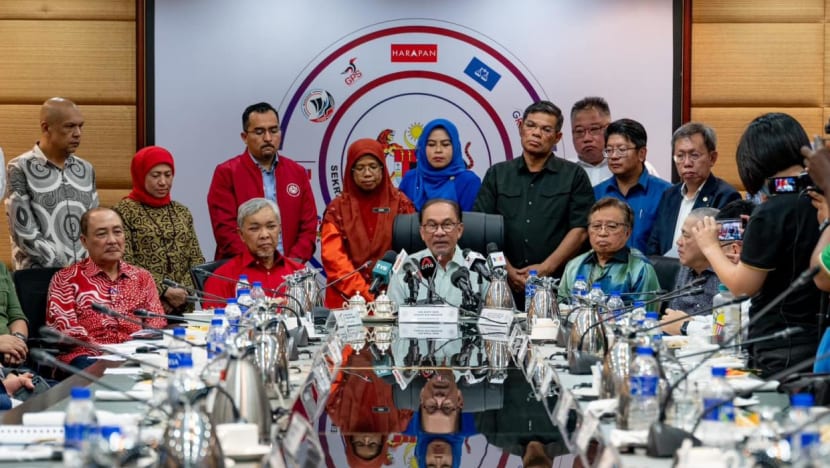Commentary: Next challenge for PM Anwar’s PKR - keeping its anchor role in government
The Parti Keadilan Rakyat leadership elections turned out to be intense and not without controversy. But Prime Minister Anwar Ibrahim’s party has a far bigger challenge ahead, says this public policy consultant.

KUALA LUMPUR: Parti Keadilan Rakyat (PKR) has gone through another change in its leadership line-up following intense internal party elections on May 24. With the party’s top leaders in place, PKR has quite a hill to climb in retaining influence in the unity government and keeping the country’s top political job.
The anchor party of the Malaysian federal government elected Nurul Izzah Anwar as the deputy president, defeating former Minister of Economy Rafizi Ramli. Leaders aligned with Nurul Izzah also dominated the newly elected central leadership council. Minister of Natural Resources and Environmental Sustainability Nik Nazmi Nik Ahmad also failed to defend his vice-president post. Both Rafizi and Nik Nazmi resigned from the Cabinet just days after the PKR elections.
Prime Minister Anwar Ibrahim, who won the party presidency unopposed, swiftly rejected claims of nepotism following his daughter’s victory, arguing that Nurul Izzah was democratically elected by PKR members. Despite the predictable outrage expressed on social media by supporters of Rafizi and complaints of electoral irregularities, the party will likely recover from the divisive elections.
This was not the first time PKR had to go through an intense contest for the deputy presidency. The position has been contested at every party election since 2010. Nurul Izzah is also a popular figure within the party; she had consistently won the highest number of votes for the vice-president post at every party election from 2010 to 2018.
But the PKR’s focus should not be on internal elections.
The party’s biggest challenge is maintaining its position in the unity government coalition and ensuring that Anwar is re-elected as prime minister.
This challenge was acknowledged by Nurul Izzah’s and Rafizi’s campaigns. As it stands, there are clouds on PKR’s horizon.
ANCHOR PARTY BY CIRCUMSTANCES
Despite its leadership position in the unity government, PKR has only 31 seats in the 222-member House of Representatives. Its role as the anchor party is made possible with help from its Pakatan Harapan (PH) partners – the Democratic Action Party (DAP), Parti Amanah Negara and the United Progressive Kinabalu Organisation. The coalition collectively controls 81 seats in the House, making it the largest bloc in Parliament.
Two other key members of the unity government, Barisan Nasional (BN) and Gabungan Parti Sarawak, control 30 and 23 seats, respectively. Together, the three coalitions control 134 of the 222 seats in the House.
PKR’s role as the anchor party of the unity government is a result of external circumstances beyond the party’s control.
First, overwhelming support from ethnic Chinese voters helped the DAP win 40 of the 55 seats it contested in 2022. Second, BN’s failure in many Malay-Muslim majority seats led to the opposition Perikatan Nasional (PN) winning 74 seats.
DAP may be able to keep ethnic Chinese voters on its side and boost PH’s parliamentary seat count, but there is no guarantee that the seat distribution between PN and BN will remain the same after the next general elections.
Ramanan Ramakrishnan, a PKR Member of Parliament and one of the winners of the four vice-president posts, declared that the party could potentially win 70 to 80 seats at the next general election, with Nurul Izzah as deputy president and elections director. Ramanan’s statement was dismissed by Rafizi, who estimated that PKR would only be able to contest up to 50 federal seats – half of the 100 that it contested at the 2022 General Election.
Rafizi’s estimation was based on what he said was an understanding with other unity government parties, especially BN, that PKR would defend only the 31 seats it won and the seats where the party came second. Rafizi likely referred to the PH-BN approach taken at the 2023 state elections to avoid three-cornered contests with PN.

COMPETITION OVER SEAT ALLOCATIONS
This public disagreement over the projected number of seats the party could win suggests that the party’s next strategic focus is on outmanoeuvring unity government partners in the battle for seat allocations.
The competition over seat allocations started promptly following the conclusion of the party elections. In her first speech after she was confirmed as the deputy president, Nurul Izzah declared that the party should contest in 13 constituencies in the upcoming Sabah state election that must be held before the end of the year.
PKR’s plans for the state election have no impact on the balance of power in Parliament after the next general election. But the party’s plans will influence seat allocations at the federal level.
At the last Sabah state election in 2020, PKR contested only seven out of the 73 seats. It entered the Sabah state elections as a junior partner of the informal “Warisan Plus” coalition led by Parti Warisan Sabah (Warisan), which was then leading the state government.
The outcome of the elections was disastrous. Warisan lost the state government, and PKR won only two of the seven contested seats.
The situation for PKR in the Sabah legislative assembly is not unique. Outside of Selangor, Penang, Negeri Sembilan and Perak, it has no meaningful presence in nine other state legislative assemblies. With limited influence at the state level, PKR has no choice but to ensure it dominates federal politics through respectable representation in Parliament.
UMNO’S AMBITION TO BECOME DOMINANT PARTY
The writing is on the wall. PKR would have to spar with its partners in the ruling coalition for federal seats; as a result, intense competition within the unity government can be expected.
The initial rumblings of such a contest are already evident. The United Malays National Organisation (UMNO) has openly declared its ambition to become the dominant party after the next general election.
The logical extension of this was left unsaid: If UMNO becomes the dominant party, it would be able to claim the position of the prime minister.
Currently, UMNO leads the BN coalition with 26 seats. Among the BN partners, the Malaysian Chinese Association has two seats. The Malaysian Indian Congress and Parti Bersatu Rakyat Sabah have one seat each.
The PKR elections may have provided clarity around the leadership succession. The next biggest challenge for the party is to ensure it remains the anchor party in the federal government after the next general elections.
This time, however, PKR will seek to become the dominant party not by accidental circumstances, but by design. This will be a monumental challenge.
Adib Zalkapli is a public policy consultant advising companies in navigating political challenges in Asia. This commentary first appeared on the ISEAS-Yusof Ishak Institute's blog, Fulcrum.












.jpg?itok=XizGOa3-)




